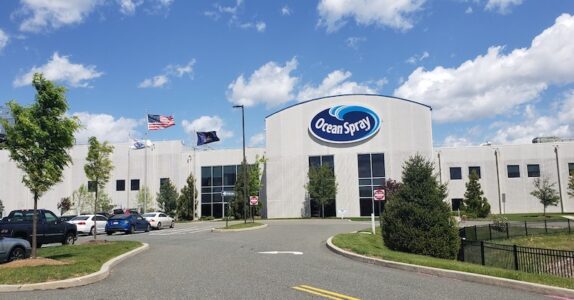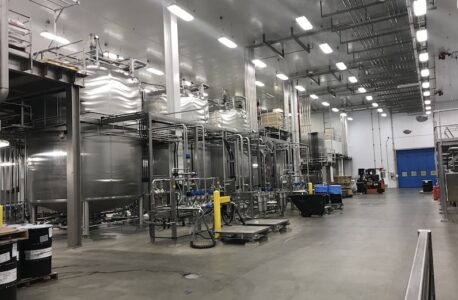Founded in 1930, Ocean Spray Cranberries, Inc., is a vibrant agricultural cooperative owned by more than 700 cranberry farmers in the United States, Canada, and Chile who have helped preserve the family farming way of life for generations. The Cooperative’s cranberries are currently featured in more than 1,000 great-tasting, nutritious products in over 100 countries worldwide.

To meet consumer and customer demand, Ocean Spray operates a number of state-of-the-art food and beverage manufacturing facilities, including its 300,000-square-foot Lehigh Valley, Pennsylvania location that opened in 2014. This manufacturing plant replaced the company’s Bordentown, New Jersey facility that had been in operation for 71 years.
Ocean Spray’s Lehigh Valley plant employs approximately 200 full-time team members who run four production lines that produce 24,000 bottles an hour, 24/7. The Lehigh Valley facility delivers 100,000 cases every day so any disruption in the facility’s production time can have a major impact on Ocean Spray’s ability to provide the products consumers love.
Energy Conservation
One of the design tenets of this plant prior to construction was to save $1.5 million in energy costs when producing 31 million cases, which couldn’t have been accomplished with the originally specified three, 800-horsepower boilers. Company engineers thought they’d need big boilers for steam to pasteurize juice concentrate, a complex and costly system that the industry relied on for years. However, after working in collaboration with an energy consulting firm, and conducting an audit at the previous Bordentown plant to determine exactly how much energy would be required to manufacture 100 million gallons of juice annually, it switched mid-design to incorporating energy efficient equipment and building designs. Savings were achieved through equipment that cost millions less up front, which cut the plant’s carbon emissions and slashed its gas bill. Just by switching from steam to a more efficient heat recovery system, the plant reduced energy consumption by 37%.
Lehigh Valley uses a hydronic loop system to deliver and recover process heat into HVAC and eliminate the need for steam to process juice. The heat recovery system is so efficient that Lehigh Valley does not need to purchase fuel for heating during the winter months.
The savings are the result of several technical factors that primarily involve positive pressurization of the plant, meaning the facilities are pressurized in a way that push out outside air so it can’t enter the building. This has a big impact on heating and cooling costs. At the time of construction, the facility was the only juice plant in North America that used this technology that relies on hot water — not steam — in its pasteurization.
Ensuring Efficiencies, Reducing Downtime
Ensuring safe and efficient operations is critical to Ocean Spray’s business. Therefore, to help reduce maintenance expenses and ensure minimal unplanned equipment downtime, Ocean Spray implemented the GE iFIX SCADA system coupled with WIN-911 Advanced remote alarm notification software to continuously monitor and provide data on the various alarms set up throughout the Lehigh Valley facility.

Used primarily by the maintenance team and overseen by Joe Faller, Ocean Spray Lehigh Valley controls automation engineer, WIN-911 and the iFIX SCADA monitor flows, pressures and temperatures on the facility’s loops, process loops, and wastewater system, ensuring proper levels so that the juice production is safe and meets the company’s high standards for quality and safety. At 10,000 gallons of juice produced per hour and 100,000 cases every day, this is no small task. When Faller and his team receive notification of an alarm through text messages, they can quickly assess and resolve issues to minimize potential impact.

“The software’s alarm escalation hierarchy feature helps our team know if there is a possible issue, so we can respond and quickly resolve the problem,” Faller commented.
Faller sets up alarms in the programable logic controller and sends them to iFIX, which is integrated with the remote alarm notification software. WIN-911 monitors a vast array of critical process loops that include a 230-hot water, three steam boilers, a 44-cooling loop, a 28-cooling loop, an 85/95 plant cooling loop, and a heating loop.
“Monitoring and providing notification when there are problems with equipment not watched 24/7, is a huge benefit for our team. WIN-911 allows us time to rectify these issues before they become problems,” Faller added.
The longer it takes plant personnel to respond and repair equipment, the more damaging the interruption. Remote alarm notification software is helping to ensure the Ocean Spray Lehigh Valley Beverage Facility remains operational 24/7.
(All images courtesy of Ocean Spray Lehigh Valley Beverage Facility)





















![[VIDEO] Collect Asset Data at the Speed of Walking a Building](https://facilityexecutive.com/wp-content/uploads/2024/02/maxresdefault-324x160.jpg)